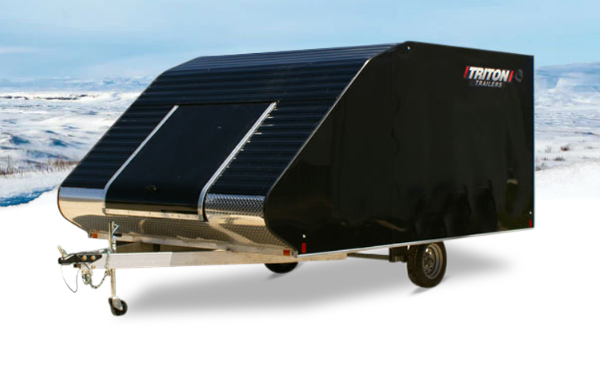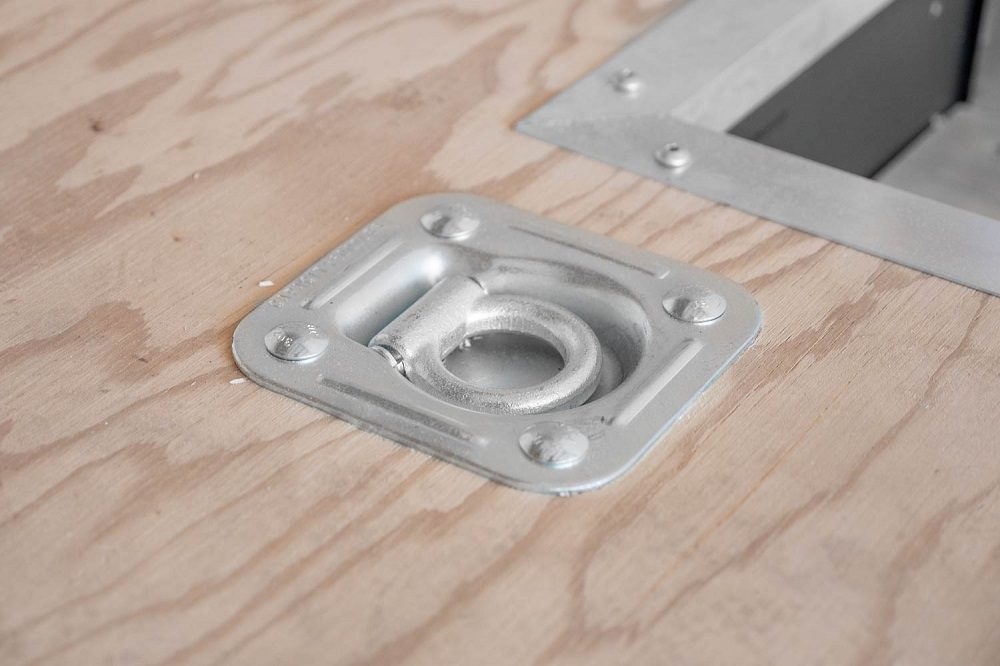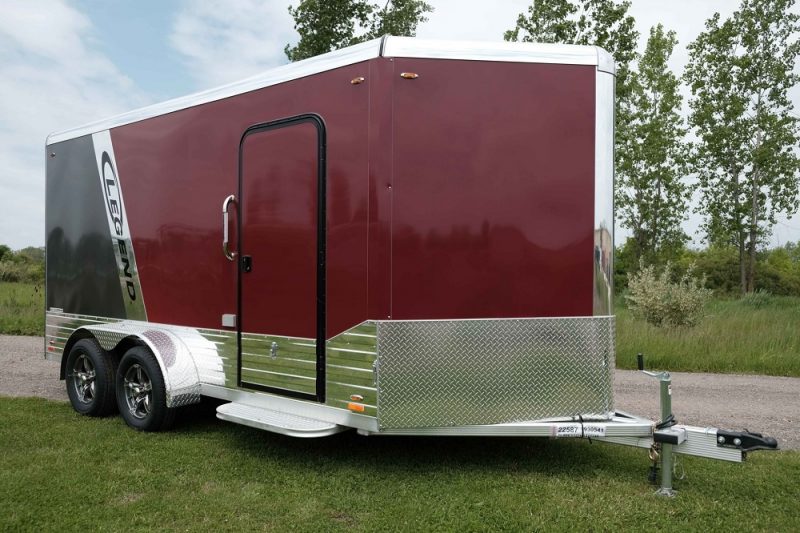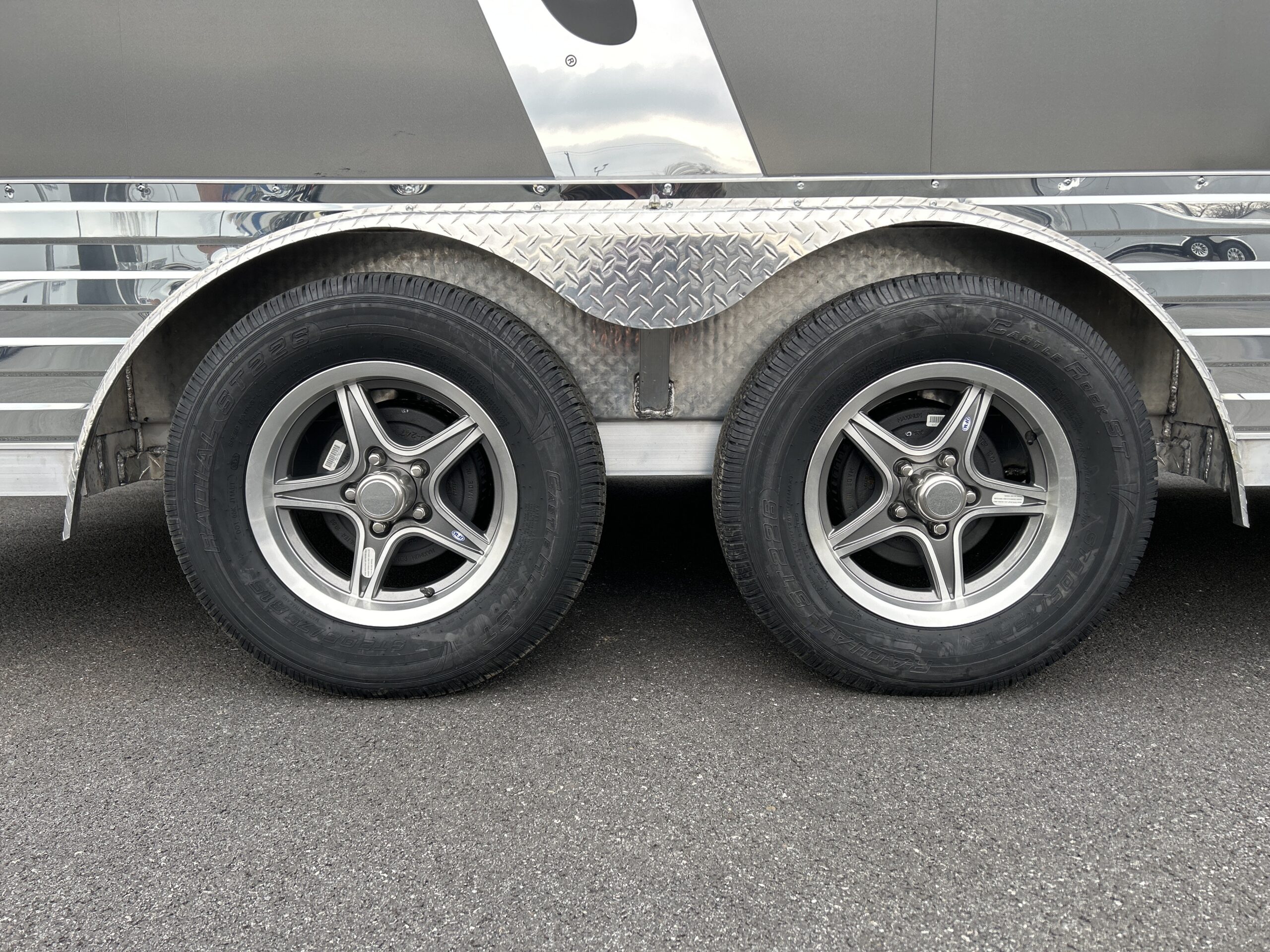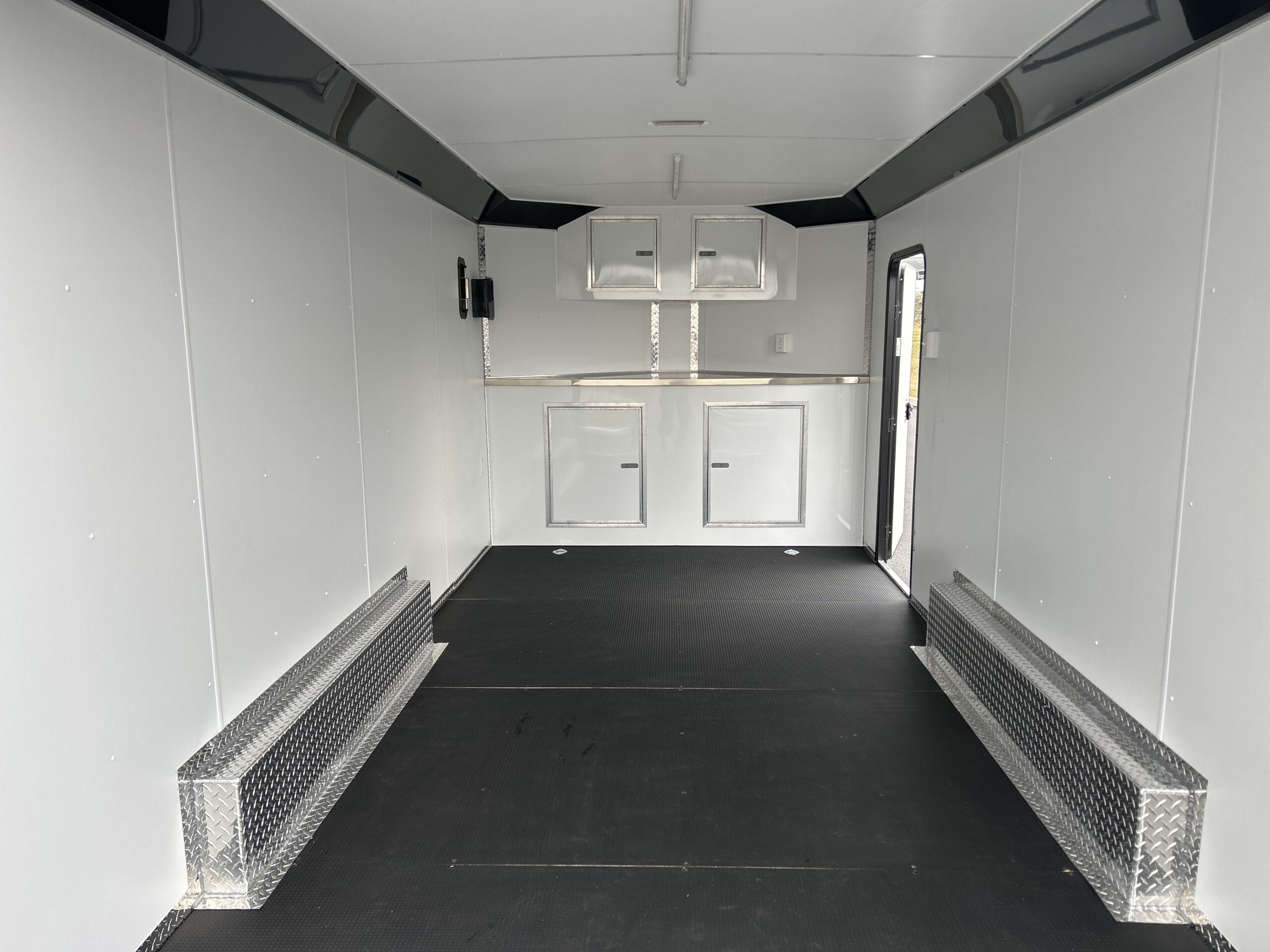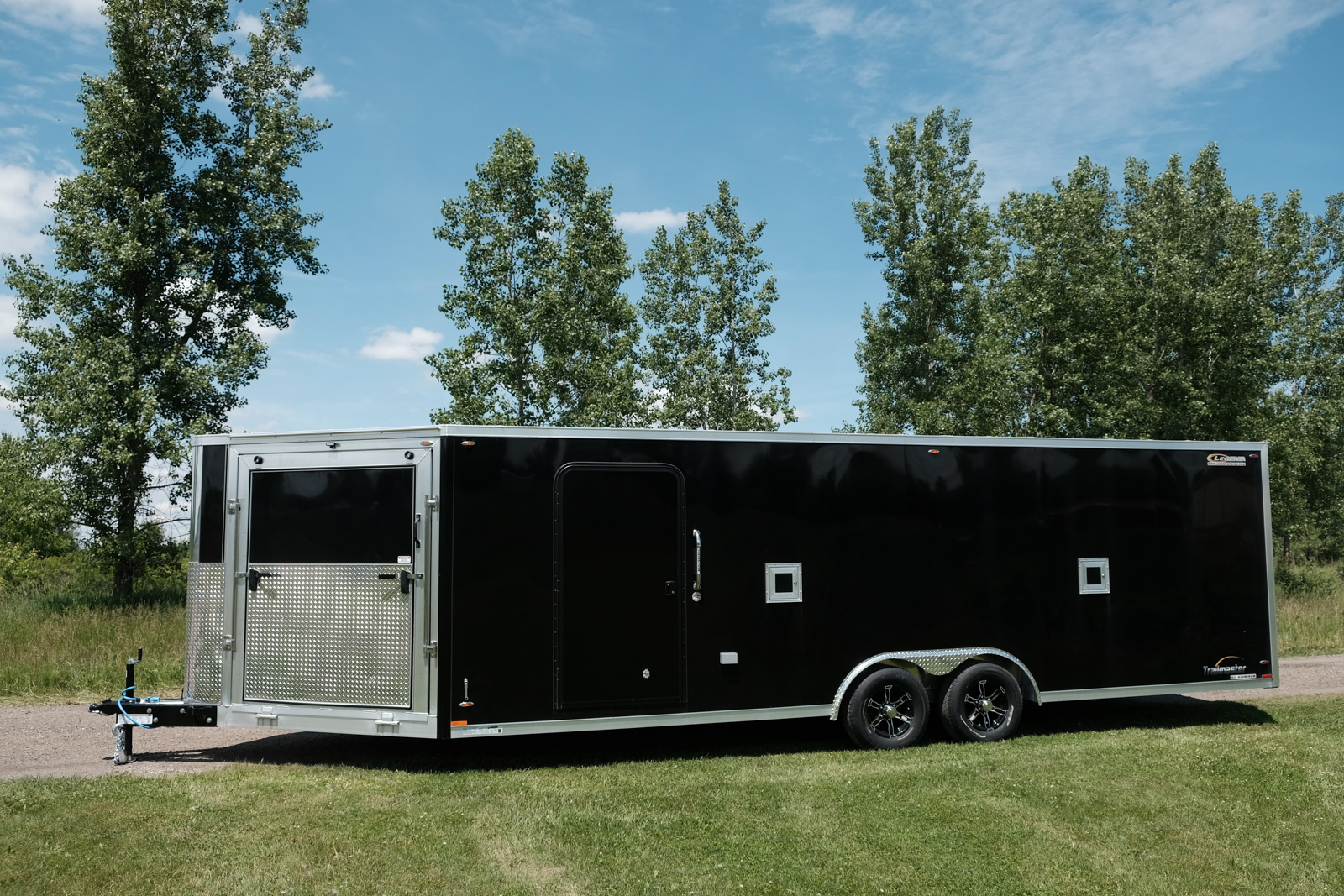As we go about our daily work, a hardworking hero moves among us—the enclosed trailer. Nearly every day, you see one speeding down an interstate highway or parked on a job site. From delivering furniture to protecting critical construction tools, these versatile boxes on wheels are excellent for transporting personal or business cargo.
You may be considering how an enclosed trailer could help you or your business. Choosing the right trailer can be intimidating. Let’s open the doors of an enclosed trailer and explore the most important information you need for a good discussion.
What Is an Enclosed Trailer?
Enclosed trailers (also called cargo trailers, box trailers, or covered trailers) are fully enclosed units designed to transport goods, equipment, or cargo. Unlike open trailers, they have sides and a roof, which protects their contents from weather, theft, and road debris. Enclosed trailers are available in many sizes and styles to meet many hauling needs.
Uses for Enclosed Trailers
Enclosed trailers are versatile and used for a wide range of purposes. Some of their most common uses include:
- Hauling Equipment: Contractors and handymen use enclosed trailers to transport their tools and machinery.
- Moving: Enclosed trailers are ideal for individuals or families moving personal belongings from one location to another.
- Storage Solutions: Enclosed trailers can be mobile storage units for extra goods, inventory, or seasonal equipment.
- Recreational Uses: Enclosed trailers are popular among racing enthusiasts, outdoor adventurers, and sports teams for hauling recreational vehicles, bikes, and gear.
- Vending and Concessions: Small businesses convert enclosed trailers into mobile shops or concession stands for events and festivals.
- Landscape and Maintenance: Landscapers and maintenance crews transport plants, mowers, and other landscaping equipment in enclosed trailers.
- Livestock Transport: Specialty enclosed trailers safely haul animals like horses or cattle.
- Emergency Services: Enclosed trailers serve as mobile command centers, workshops, or equipment carriers for fire departments, police, and disaster relief operations.
Types of Enclosed Trailers Available
Enclosed trailers come in various types to serve different needs:
- Utility Enclosed Trailers: Typically smaller and more basic, these are used for general hauling and are suitable for personal or light commercial use.
- Cargo Enclosed Trailers: These come in multiple sizes and are equipped to carry a range of cargo types, from furniture to commercial goods.
- Car Haulers: Specifically designed to transport vehicles, these usually have reinforced floors and ramps for easy loading and unloading.
- Motorcycle Trailers: Tailored for motorcycle enthusiasts, these trailers have built-in wheel chocks and tie-downs for stability.
- Gooseneck Trailers: They feature a gooseneck hitch, allowing for better stability and increased weight capacity; they are ideal for heavy commercial uses.
- Specialty Trailers: Custom enclosed trailers built to specific requirements for unique applications, such as mobile offices, workshops, or professional racing teams.
Each type of enclosed trailer is designed with specific features to accommodate different types of cargo and usage scenarios, ensuring a suitable option for nearly any requirement.
The Benefits of Owning an Enclosed Trailer
Enclosed trailers offer a range of advantages for both personal users and business owners. Here’s an overview of the key benefits:
Security and Protection for Cargo
Enhanced Security
Enclosed trailers provide superior security for stored items. Features like lockable doors and robust construction help protect cargo from theft.
Cargo Protection
Unlike open trailers, enclosed models shield contents from road debris, dust, and adverse weather conditions, reducing the risk of damage during transportation.
Reduced Weather Delays
The ability to haul in various weather conditions means fewer delays in your work or moving schedule, enhancing efficiency and reliability.
Versatility for Personal or Business Use
Wide Range of Uses
For personal use, an enclosed trailer can serve as additional storage, help with large family moves, or transport recreational equipment like ATVs or motorcycles. For businesses, these trailers can ferry tools, goods for sale, or equipment for job sites.
Customizable Spaces
Many enclosed trailers can be customized with shelving, hooks, and other organizational systems.
Longevity and Resale Value
Durable Construction
Built to last, enclosed trailers can withstand the rigors of frequent use and heavy hauling. Sturdy construction means fewer repairs and a longer service life.
Good Resale Value
Because of their durability and wide range of utility, enclosed trailers have a good resale value. The market for used trailers is strong, and a well-maintained enclosed trailer can retain a significant portion of its original purchase price.
By providing a secure, weather-resistant, and versatile transportation solution, an enclosed trailer can be a beneficial long-term investment for either personal or professional use. Whether you need it for occasional personal moves or regular business operations, an enclosed trailer offers a dependable way to protect and transport your valuable assets.
Choosing the Right Enclosed Trailer
When selecting an enclosed trailer, make an informed decision after considering several critical factors. These considerations ensure the trailer meets your specific requirements and provides lasting value.
Size and Weight Considerations
Size
The dimensions of an enclosed trailer are critical. Consider what you’ll be hauling. You’ll need a larger trailer if you move large items like furniture or vehicles. Standard trailer widths are 5’, 6’, 7’, and 8.5’, with lengths varying from 8’ to 32’ or more. Height clearance is also critical, especially if you’re transporting tall items or would like to be able to stand inside. Be sure to purchase a trailer large enough for your needs, but don’t pay for a larger trailer than is practical.
Weight
Know the Gross Vehicle Weight Rating (GVWR) and the trailer’s empty weight. Ensure your towing vehicle can handle the trailer’s total weight plus the cargo. Overloading a trailer is dangerous and may damage both the trailer and the tow vehicle.
Number of Axles
A single-axle trailer is perfect for hauling loads under 3,000 pounds and can be pulled by lighter-duty trucks and vehicles. It typically costs less to maintain and is more fuel-efficient. Multiple-axle trailers distribute weight and are ideal for heavier loads. Investigate the pros and cons of leaf-spring and torsion axles to choose the best axle for your application.
Buying New vs. Used
New
Buying new comes with the assurance of a warranty, the latest features, and no wear. It’s a good choice if you must have a trailer with specific features or want a custom configuration.
Used
Opting for a used trailer can be more cost-effective. Inspect a used trailer thoroughly for any signs of wear or damage. Ensure the trailer has been well-maintained to minimize any unforeseen costs.
Material and Construction Quality
Frame Construction
Appearances can be misleading. No matter how nice the outside of the trailer looks, the frame is arguably the most important component. Steel frames offer strength but can be prone to rust if not properly treated. Aluminum frames are lighter and resist corrosion, but they may be less durable under heavy loads or rough conditions.
Walls and Flooring
Look for trailers with robust wall and floor materials. Plywood-lined interiors are typical, but stronger, engineered wood walls can provide additional strength and durability.
Check the cross members and floor material for support and strength, especially if you’ll be hauling heavy items like vehicles. Floor supports are typically spaced 24 inches on the center but can be changed to 16 inches or 12 inches on the center. Double flooring is a possible upgrade.
Nose Shape
Which is better for your trailer–a V-nose or a flat nose? A V-nose trailer offers superior handling characteristics and slightly better fuel mileage. Flat-front trailers can be better suited for some cargo.
Features to Look For
Ventilation
Adequate ventilation prevents condensation inside the trailer and maintains air quality, especially for transporting animals or sensitive materials.
Tie-Downs
Ensure enough tie-down points are strategically placed and robust enough to secure your cargo safely.
Ramp Doors
A ramp door can be invaluable for loading and unloading heavy or wheeled items. Consider the door’s strength and whether it’s spring-assisted for easy operation.
Lighting and Electrical
Check the interior and exterior lighting. LED lights offer durability and better visibility. If you plan to work inside the trailer or need to charge devices, consider models with built-in electrical outlets.
Security Features
Lockable doors, quality latches, and security systems are essential, especially if you store valuable items in the trailer.
Choosing the right enclosed trailer involves carefully considering these factors. Weighing all the factors ensures that you buy a trailer that suits your hauling needs, fits your budget, and provides the security and functionality you require.
How to Maintain Your Enclosed Trailer
Maintaining your enclosed trailer is crucial to ensure its safety, efficiency, and longevity.
Regular Maintenance Tips
Tire Inspection and Care
Check tire pressure regularly and look for signs of wear or damage. Rotate and replace tires as needed to prevent blowouts and ensure good traction. Don’t forget to check the pressure in the spare tire.
Lubrication of Moving Parts
Keep all moving parts, including door hinges, ramps, and cargo securing equipment, well-lubricated to prevent rust and ensure smooth operation.
Brake System Maintenance
Have the brake system, including brake pads, drums, and connections, inspected at least once a year to ensure proper functioning. Properly functioning brakes keep you and your cargo safe.
Roof and Seals Check
Inspect the roof and all seals around doors and windows annually. Repair cracks or holes immediately to protect the interior and cargo from water damage.
Electrical System Check
Regularly test all lights, including brake lights, turn signals, and interior lights. Clean the connectors and replace burnt-out bulbs to ensure your trailer is visible and compliant with road safety regulations.
Cleaning
Wash the trailer’s exterior regularly to remove dirt, road salt, and other debris. Clean the interior floors and walls to prevent damage and corrosion.
Long-Term Storage Advice
Proper Ventilation
Ensure your trailer is well-ventilated during storage to prevent mold and mildew from moisture build-up.
Tire Care
To avoid flat spots from prolonged pressure, consider placing your trailer on jack stands or periodically moving it slightly.
Pest Control
Seal any openings and remove all food and waste to discourage rodents and insects from making a home in your trailer.
Weather Protection
Store your trailer under a canopy or use a high-quality weatherproof cover to protect against sun, rain, snow, and debris.
Customization and Accessory Recommendations
Shelving and Storage Solutions
Install custom shelving, cabinets, or racks to optimize space and organize tools and materials.
Lighting Upgrades
Add additional LED lighting, especially if you load and unload in low-light conditions.
Flooring Upgrades
Durable rubber mats or vinyl flooring can protect the original floor and make cleanup easier, especially if you transport liquids or dirty equipment.
Security Features
Upgrade locks and add a security system or GPS tracker for added protection against theft, especially if you store valuable tools or goods in the trailer.
Ventilation Upgrades
Adding roof or side vents can help manage the interior air quality essential for live cargo and sensitive materials.
By following these maintenance tips, storing your trailer correctly when not in use, and considering thoughtful customizations, you can significantly extend the life of your enclosed trailer and improve its usability.
Cost Analysis: Investing in an Enclosed Trailer
An enclosed trailer’s cost can vary widely depending on its size, construction materials, brand, features, and whether it is new or used. Here is a general overview of pricing:
Small Single Axle Trailers (4×6 to 6×12 feet)
These trailers cost between $5,000 and $8,000. They are suitable for light residential use or small businesses.
Medium Tandem Axle Trailers (7×14 to 8.5×16 feet)
Prices can range from $11,000 to $15,000. This category can accommodate heavier loads and commercial purposes.
Large Tandem Axle Trailers (8.5×20 feet and up)
These trailers can start around $13,000 and go well beyond $20,000, especially when customized or equipped for specialized applications such as car hauling or as a mobile workshop.
Remember that prices vary significantly based on region, current market conditions, and the trailer’s features.
Financing and Insurance Considerations
Financing
Many dealerships offer financing options for buying an enclosed trailer. Interest rates and terms depend on your credit rating and the financing institution. It is essential to shop around for the best rates and calculate the final price, including interest.
Insurance
Even if you are not legally required to insure your trailer against damage and theft, you may want to if you will transport valuable goods. The cost of insurance will depend on the value of the trailer, its contents, and the type of coverage you select. Contact your existing vehicle insurance provider; they may offer discounts for bundling services.
Cost vs. Benefit Analysis
When analyzing the cost versus the benefits of investing in an enclosed trailer, consider the following:
Primary Use
If you frequently rent trailers or pay for shipping or moving services, owning your own enclosed trailer can save you money in the long run.
Resale Value
High-quality trailers from reputable manufacturers retain value over time, especially with proper maintenance.
Convenience
Having immediate access to your trailer can save you considerable time and provide the convenience of transporting goods on your schedule.
Security and Protection
An enclosed trailer reduces the risk of theft and weather damage, saving money on replacement costs.
Tax Advantages
If you use the trailer for business, you can deduct expenses like depreciation, maintenance, and operating costs from your taxable income.
To perform a detailed cost-benefit analysis:
- Calculate initial costs: Include the purchase price, taxes, registration, insurance, and any immediate customization or repairs.
- Estimate ongoing costs: Factor in maintenance, storage, increased fuel usage, and insurance premiums.
- Evaluate potential savings: Consider how much you currently spend on rentals, movers, or delivery services and how much you could save if you had your own trailer.
- Assess intangible benefits: Evaluate how the convenience, security, and flexibility of owning an enclosed trailer might benefit you or your business, even if these benefits don’t directly translate into quantifiable savings.
After compiling this information, you’ll see whether investing in an enclosed trailer makes financial sense for your situation. It can be a solid investment if the long-term savings and benefits outweigh the upfront and ongoing costs. If the numbers are close, those intangible benefits might tip the scales in favor of purchasing.
How to Buy an Enclosed Trailer
Online Purchases
Pros:
- You can browse many dealerships and private sellers nationwide and evaluate a wider selection of trailers.
- You can access more competitive pricing and convenient comparison shopping.
- Some online marketplaces provide user reviews and seller ratings.
Cons:
- You cannot physically inspect the trailer before making a purchase.
- Shipping costs can be high, especially for long distances.
- You risk falling victim to a scam or misleading listing.
In-Person Purchases:
Pros:
- Direct inspection of the trailer allows you to check the build quality and trailer condition.
- You can negotiate the price and terms face-to-face.
- You will likely be able to take possession of the trailer immediately after purchase.
Cons:
- Your options are limited to what’s available within a reasonable traveling distance.
- You could spend extra time visiting multiple dealerships or sellers.
Guide to Finding a Reputable Dealer
Research
Look for dealerships that specialize in trailers and have good reputations. Online reviews and recommendations from friends or industry contacts can provide valuable insights.
Experience
The longer a dealer has been in business, the more likely it is to sell quality trailers and provide reliable service.
Customer Service
Look for dealers that are helpful, knowledgeable, and responsive. Responsiveness indicates they will provide good customer service after you buy a trailer from them.
Warranty and Service
Check if the dealer provides warranty coverage and if they offer repair and maintenance services.
Certifications
A dealer affiliated with recognized trade organizations or manufacturers often cares about maintaining its reputation with those organizations.
Inventory
A wide trailer selection can indicate a reputable dealer. However, be wary of dealers with prices significantly lower than market rates. Cut-throat prices could indicate low-quality products.
Checklist for Inspecting a Trailer Before Purchase
When you inspect a trailer before purchasing, use this checklist to ensure you assess all critical areas:
General Inspection
- Structure
Look for solid construction, quality welds, and proper alignment. - Suspension
Check for wear or damage on the axles, springs, and mounting hardware.
Tires
- Condition
Look for tread wear, cracks, or bulges. - Age
Check the date code to ensure they’re not too old, even if unused.
Brakes
- Pads and Lines
Inspect for wear and proper operation. - Electrical Connection
Ensure the brake controller and connections work.
Electrical System
- Lights
Check that all exterior and interior lights operate correctly. - Wiring
Look for any exposed or damaged wiring.
Exterior
- Body
Check for dents, rust, or damage to the body and floor. - Doors
Ensure doors and latches operate smoothly and seal properly. - Paint
Look for bubbling or cracks, indicating potential rust underneath.
Interior
- Walls and Ceiling
Inspect for leaks or water damage. - Flooring
Check for strength and any signs of rot or wear.
Before finalizing the purchase, we recommend taking the trailer for a test tow. Have an experienced mechanic or inspector evaluate it, especially if purchasing used. A professional inspection can help identify issues that may not be immediately apparent.
Conclusion
Whether you’re a small business owner, a contractor, or someone frequently participating in recreational activities, the possibilities afforded by an enclosed trailer are as valuable as they are varied.
If helping your business, safeguarding your tools, or simplifying your adventures sounds appealing, it may be time to consider how an enclosed trailer could unlock your potential.
With three convenient locations, Burkholder Trailers is Central Pennsylvania’s trusted trailer dealer. We not only sell a wide range of quality trailers but also offer quality trailer parts and accessories. If you are looking for highly experienced technicians to service your trailer, visit one of our three shop locations.
You can check our stock at Burkholder’s Enclosed Trailers or visit one of our locations to see the options in person.




